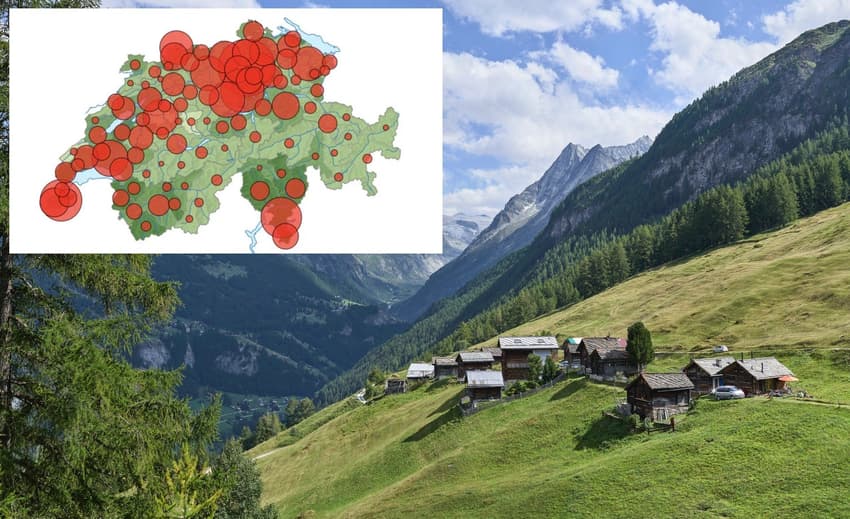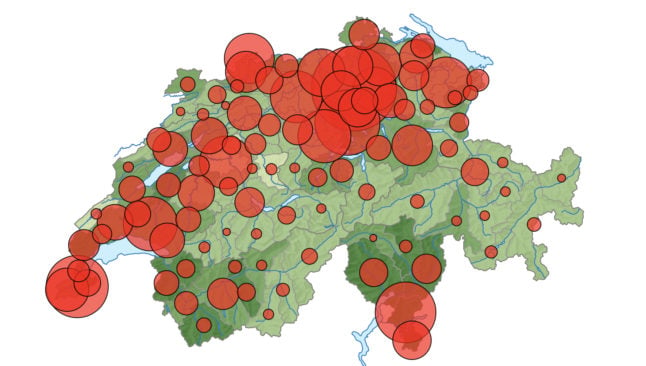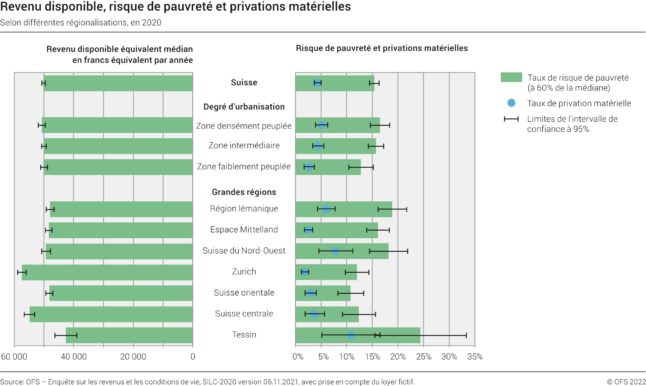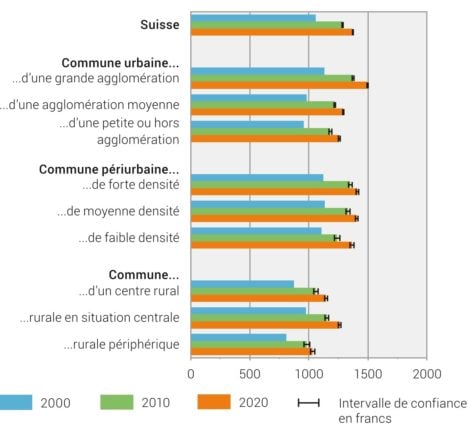EXPLAINED: The striking contrasts between Switzerland's regions

The word "Switzerland" usually conjures up images of a small, mountainous and affluent country, but as a new study shows, there are significant disparities between various regions.
To many people living abroad, Switzerland is a homogeneous nation of bankers, watchmakers, chocolate, cheese and mountains.
But unless you actually live here, you will likely not know that Switzerland is a diverse country — not only linguistically and culturally, but also in terms of its, economy, infrastructure, costs, and other aspects.
These differences are shown in a new study published by the Federal Statistical Office (OFS).
"Switzerland is diverse and rich in regional disparities. It presents striking contrasts between urban centers and mountain regions, but also experiences important differences within the agglomeration areas", researchers reported.
Of nine categories measuring regional differences that OFS focused on, these are the main ones that impact foreign residents living in Switzerland the most:
Employment
Not surprisingly, most jobs are generally found in urban areas, especially in the agglomerations of Zurich (including the nearby Zug), Geneva and Lausanne.
However, when looking specifically at jobs that were created in new companies outside of the above-mentioned markets, most are found in agglomerations of Lugano and Mendrisio, Luzern, St. Gallen, Aarau-Olten, Reinach-Allschwil, and Freienbach-Glarus.

The largest red spots indicate where most new jobs were created. Image: OFS
READ MORE: Employment: This is where Switzerland’s jobs are right now
Wages
As the OFS pointed out, “differences in income between regions can encourage population movements and thus contribute to reinforcing disparities. Income distribution and social protection are important indicators of social well-being and equality”.
The highest incomes, according to OFS, are in the region of Zurich and Central Switzerland, with the greater Zurich region being “characterised by one of the lowest at-risk-of-poverty rates”.
READ MORE: REVEALED: What are the best and worst paid jobs in Switzerland?
This chart (in French) shows where in Switzerland salaries are highest and lowest.

Taxes
As the OFS has noted, "the tax burden has an influence in the choice of the place of residence or establishment…There is tax competition between the cantons and between the municipalities”.
The lowest taxation rates for individuals and families are found in the central Swiss cantons of Zug, Nidwalden and Schwyz, “with Zug having the lowest tax burden”, according to FSO.
The highest rates, on the other hand, are in the French-speaking cantons of Geneva, Neuchâtel, Vaud and Jura.
READ MORE: EXPLAINED: How where you live in Switzerland impacts how much income tax you pay
Rents
The highest rents are found in the urban municipalities of large agglomerations, while the lowest rents are in the rural regions, which is the usual, long-term pattern.
This chart shows how the rents have increased in the past two decades in Switzerland as a whole, followed by urban centres, suburbs of big cities, and smaller communities.

Image: OFS
Services and infrastructure
Both are among the main determinants “of the economic and residential quality of a region. Combined with each other, infrastructures and services count in the choice of a place of residence or establishment”, the study found.
Among services that fall under this category is the proximity of public transportation stops, schools, shopping, and leisure / recreational activities.
While most people in Switzerland live reasonably close to this infrastructure, “access distances are above average in rural areas for almost all the services analysed”, OFS reports, adding that “distances are approximately twice as long in rural areas as in urban ones”.
Comments
See Also
To many people living abroad, Switzerland is a homogeneous nation of bankers, watchmakers, chocolate, cheese and mountains.
But unless you actually live here, you will likely not know that Switzerland is a diverse country — not only linguistically and culturally, but also in terms of its, economy, infrastructure, costs, and other aspects.
These differences are shown in a new study published by the Federal Statistical Office (OFS).
"Switzerland is diverse and rich in regional disparities. It presents striking contrasts between urban centers and mountain regions, but also experiences important differences within the agglomeration areas", researchers reported.
Of nine categories measuring regional differences that OFS focused on, these are the main ones that impact foreign residents living in Switzerland the most:
Employment
Not surprisingly, most jobs are generally found in urban areas, especially in the agglomerations of Zurich (including the nearby Zug), Geneva and Lausanne.
However, when looking specifically at jobs that were created in new companies outside of the above-mentioned markets, most are found in agglomerations of Lugano and Mendrisio, Luzern, St. Gallen, Aarau-Olten, Reinach-Allschwil, and Freienbach-Glarus.

The largest red spots indicate where most new jobs were created. Image: OFS
READ MORE: Employment: This is where Switzerland’s jobs are right now
Wages
As the OFS pointed out, “differences in income between regions can encourage population movements and thus contribute to reinforcing disparities. Income distribution and social protection are important indicators of social well-being and equality”.
The highest incomes, according to OFS, are in the region of Zurich and Central Switzerland, with the greater Zurich region being “characterised by one of the lowest at-risk-of-poverty rates”.
READ MORE: REVEALED: What are the best and worst paid jobs in Switzerland?
This chart (in French) shows where in Switzerland salaries are highest and lowest.

Taxes
As the OFS has noted, "the tax burden has an influence in the choice of the place of residence or establishment…There is tax competition between the cantons and between the municipalities”.
The lowest taxation rates for individuals and families are found in the central Swiss cantons of Zug, Nidwalden and Schwyz, “with Zug having the lowest tax burden”, according to FSO.
The highest rates, on the other hand, are in the French-speaking cantons of Geneva, Neuchâtel, Vaud and Jura.
READ MORE: EXPLAINED: How where you live in Switzerland impacts how much income tax you pay
Rents
The highest rents are found in the urban municipalities of large agglomerations, while the lowest rents are in the rural regions, which is the usual, long-term pattern.
This chart shows how the rents have increased in the past two decades in Switzerland as a whole, followed by urban centres, suburbs of big cities, and smaller communities.

Image: OFS
Services and infrastructure
Both are among the main determinants “of the economic and residential quality of a region. Combined with each other, infrastructures and services count in the choice of a place of residence or establishment”, the study found.
Among services that fall under this category is the proximity of public transportation stops, schools, shopping, and leisure / recreational activities.
While most people in Switzerland live reasonably close to this infrastructure, “access distances are above average in rural areas for almost all the services analysed”, OFS reports, adding that “distances are approximately twice as long in rural areas as in urban ones”.
Join the conversation in our comments section below. Share your own views and experience and if you have a question or suggestion for our journalists then email us at [email protected].
Please keep comments civil, constructive and on topic – and make sure to read our terms of use before getting involved.
Please log in here to leave a comment.